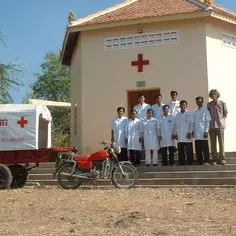
Social and Employment
Place
Cheungkok and Ampel, in the province of Kompong Cham, Cambodia
Sponsor
Thierry Aveline de Rossignol
Grant(s)
12,000 € to the Selection Committee at 2005/10/04
Project leader
"This project has certain strong points in its favour. For a start, it is being overseen by Éric Mangin, a student in the environment and hydrobiology, who has a close interest in development issues, while it also enjoys the full support of the local authorities."
Thierry Aveline de Rossignol
Several years after the fall of the Khmer Rouge, many regions of Cambodia are still struggling with high levels of poverty.
Amica (Association de médiation internationale) brings aid to one such region by working with the villages of Cheungkok and Ampel, province of Kompong Cham, in the east of the country.
Its project, launched in 2005 and dubbed "Rising sun in Cambodia", is aimed at ensuring the local, sustained development of education, health, food supplies and energy services while stimulating the local economy. It is spread over several years.
A comprehensive project
By tackling poverty on several fronts simultaneously, the project is aimed at improving the living conditions of about a thousand inhabitants.Two villages have been selected for the basic experiments.At Cheungkok, a rural economic development programme involves electrification of the village by means of solar energy, the creation of eco-tourism facilities and a study into how best to increase rice production.To include children and teenagers in this dynamic, a sports facility is being built.
The second village to benefit from the programme, Ampel, now has a rural dispensary of. Electrification on the premises helped improve vaccine storage and emergency medical care, particularly for women in labour.To support this action, Amica turned to "Médecins sans frontières", to train the local medical personnel and and continue the already popular trial programme bringing free healthcare to the local population.
The 12,000 euros in funding provided by the Veolia foundation helped purchase the key elements: solar panels and medical equipment.

